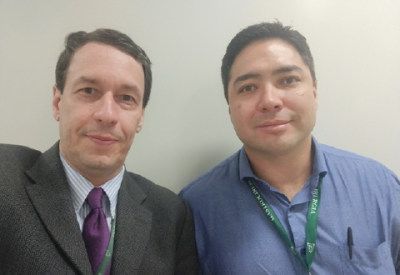In 2025, many authors shared their insights on clinical trials in our journal. Their articles published with us have received very well feedback in the field and stimulate a lot of discussions and new insights among the peers.
Hereby, we would like to highlight some of our outstanding authors who have been making immense efforts in their research fields, with a brief interview of their unique perspectives and insightful views as authors.
Outstanding Authors (2025)
Fernando A. M. Herbella and Rafael C. Katayama, Federal University of São Paulo, Brazil
Outstanding Author
Fernando A. M. Herbella (left) and Rafael C. Katayama (right)

Dr. Fernando A. M. Herbella obtained his MD, general surgery residency, gastrointestinal residency, MSc, PhD, and habilitation at the Federal University of Sao Paulo, Sao Paulo, Brazil. At the same University, he is currently assistant professor of surgery. He did his fellowship at the University of California, San Francisco, US and at the University of Rochester, US. His main interest is in the physiology and surgery of the foregut. Learn more about him on Instagram.
Dr. Rafael C. Katayama obtained his MD, general surgery residency, gastrointestinal residency, MSc, and PhD at the Federal University of Sao Paulo, Sao Paulo, Brazil. At the same University, he is currently assistant professor of surgery. His main interests are in the physiology and surgery of the foregut and bariatrics. Learn more about him on Instagram.
ACTR: What are the key elements that constitute a good design of clinical trials?
An adequate methodology is essential for the quality of a good clinical trial. This includes a calculation of the ideal sample, optimal randomization, bias prevention and a correct data analysis. Apart from this common sense, recent studies have been focusing on the application in the “real-world” of the results from clinical trials. ACTR has reviewed some of these studies (1-3). Clinical trials developers should have this concern in mind, if the results can be applied outside a controlled environment.
ACTR: How do you see the positive and negative results of a clinical trial with examples?
The quality of a clinical trial should be based on the methodology, never on the results. Scientists have control over the methods but results must be unbiased and are not under control of the authors. Negative results may prevent future researchers from spending time, money and energy searching for the same answer and may prevent clinicians from adopting determined therapy. Unfortunately, there is an almost 5 times more chance of negative results being published (4).
As a recent example of a negative-result clinical trial, we can cite the article by Zhang and Li (5). It showed no preventive effect of metformin on prostate cancer. Previous studies indicated the protective effect of metformin in at least a certain part of population, while some others contradicted the results. The result of this trial will prevent use of the drug for this cancer.
ACTR: Are there any aspects of clinical trials that you think receive insufficient attention?
Some recent trials have been reporting results that are mathematically significant but with questionable clinical applicability. E.g., some trials show and highlight the benefit of saving 30 ml of blood loss in an operation when this is certainly not relevant clinically. Readers must be careful with biased and passionate results.
ACTR: What kind of challenges have you encountered in conducting clinical trials and how did you overcome them?
We have our practice in an underdeveloped country in a governmental university. Funding is certainly the main obstacle to conducting a good quality clinical trial. Moreover, funding without commercial bias is also mandatory.
References
- Luo FX, Arter ZL, Ou SI, et al. FLAURA in the real world: osimertinib in potentially trial-eligible and ineligible patients with EGFR-mutated advanced non-small cell lung cancer. AME Clin Trials Rev 2024;2:101. doi: 10.21037/actr-24-108
- Bianco A, D’Agnano V. Real-world evidence for immune checkpoint inhibitors in extensive-stage small cell lung cancer. AME Clin Trials Rev 2024;2:3. doi: 10.21037/actr-23-32
- Sekine I. Real world data are needed to establish safety of adjuvant immune checkpoint inhibitors after pneumonectomy. AME Clin Trials Rev 2023;1:7. doi: 10.21037/actr-23-16
- Alix-Doucet AS, Vinatier C, Fin L, et al. Reporting of interventional clinical trial results in an academic center: a survey of completed studies. BMC Med Res Methodol 2024;24:93. doi:10.1186/s12874-024-02221-6
- Zhang X, Li Z. Does metformin really reduce prostate cancer risk: an up-to-date comprehensive genome-wide analysis. Diabetol Metab Syndr 2024;16:159. doi:10.1186/s13098-024-01397-7
(by Ronnie Wu, Lucine M. Gao)